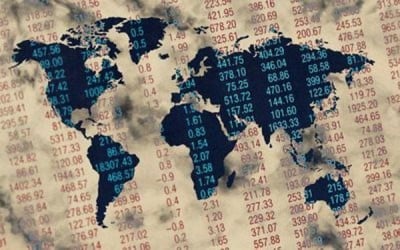Uncertain Financial Markets in 2016: Gloom and Doom…

Sharply lower global equity markets since last August reflect years of Fed-led central banks’ money printing madness, running headlong into economic contraction and instability.
China when thriving is a key engine of world economic growth, a depressant when declining. Official numbers conceal how much, at best a small fraction of its earlier annual double-digit increases.
Its plunging equity markets are flashing red on near-and-perhaps longer-term growth prospects.
Noted Gloom, Boom & Doom editor Marc Faber sees grim prospects ahead, saying “I can’t see another bull market in my lifetime.” He’s 69-years-old.
Former PIMCO CEO, current Allianz Capital Partners chief economic advisor Mohanmed El-Arian believes markets are in full-scale contagion, central banks out of ammunition to revive things.
Noted hedge fund investor Ray Dalio says the debt super-cycle of the last 50 -75 years is ending – along with the short-term one usually lasting 8 – 10 years.
In Davos at the World Economic Forum, George Soros said “China has a major adjustment problem. I would say it amounts to a crisis.”
“When I look at the financial markets, there is a serious challenge which reminds of the crisis we had in 2008.”
Low oil prices reflect weak demand and oversupply. On Thursday, crude prices surged, following a rumor about OPEC considering a possible 5% production cut.
Some member states aren’t aware of a meeting to discuss it. Saudi Arabia has been hardline on maintaining current levels.
Mixed reports about Russia surfaced. Tass reported its Energy Minister Alexander Novak’s readiness to cooperate with OPEC in discussing a possible production cut, saying:
Currently the OPEC member-states are trying to convene a meeting with participation of other OPEC (member-states) and non-(member-states) in February.
Certain countries have come forward with this initiative. Currently the issue is being worked out with the countries. On our part, we’ve confirmed our potential participation in such a meeting.
There’s been an invitation to meet at the ministerial level. In fact, there is no final agreement yet.
It will be held at the ministerial level if all ministers confirm (their participation), and in case they don’t, (the meeting will be held) at the level of experts.
When last discussed, discussion focused on all oil-producing countries cutting output by 5%. The idea was rejected.
An unnamed senior Russian official said “(t)here are not any measures on possibly cutting production being discussed now.”
A second unnamed senior Russian source said it’s “impossible to coordinate the process and stop production in Russia.”
Moscow holds regular discussions with other oil-producing countries. On Wednesday, a Kremlin source said no plans for coordinated cuts exist as of now.
Last week at the Davos World Economic Forum, Saudi state-owned Aramco chairman Khalid al-Falih said plans are to maintain current productions levels. He expects higher prices later this year.
OPEC members and non-members are divided. Some want production cut. Others fear losing market share.
Most need all the revenue they can get by continuing output at current levels – because of low prices and economic weakness.
Stephen Lendman lives in Chicago. He can be reached at [email protected].
His new book as editor and contributor is titled “Flashpoint in Ukraine: US Drive for Hegemony Risks WW III.”
http://www.claritypress.com/LendmanIII.html
Visit his blog site at sjlendman.blogspot.com.
Listen to cutting-edge discussions with distinguished guests on the Progressive Radio News Hour on the Progressive Radio Network.
It airs three times weekly: live on Sundays at 1PM Central time plus two prerecorded archived programs.

